|
|
|
Sort Order |
|
|
|
Items / Page
|
|
|
|
|
|
|
| Srl | Item |
| 1 |
ID:
158092
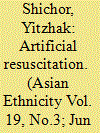

|
|
|
|
|
| Summary/Abstract |
Pan-Turkism emerged in the middle of the 19th century as an attempt to uniting all Turkic people along the Silk Road from the Mediterranean to China. After the ascent of modern Turkey under Mustafa Kemal as well as the Soviet incorporation of Central Asia, pan-Turkism had practically withered – although apparently not as an ideology. Indeed, the collapse of the Soviet Union and the subsequent independence of the Central Asia republics have provided for the revival of the pan-Turkism vision, perceived by Beijing as a threat not only to its interests in Central Asia but, moreover, to Xinjiang’s internal stability and China’s sovereignty. While this vision could hardly be accomplished, China’s intensive preoccupation with pan-Turkism has facilitated its artificial resuscitation, though it appears already deceased. Xi Jinping’s One Belt One Road initiative aims, among other things, at blocking pan-Turkism.
|
|
|
|
|
|
|
|
|
|
|
|
|
|
|
|
| 2 |
ID:
004866


|
|
|
|
|
| Publication |
Taipei, Chinese Council of Advanced Policy Studies, 1994.
|
| Description |
33p.
|
| Series |
CAPS Paper; no.7
|
|
|
|
|
|
|
|
|
|
|
|
Copies: C:1/I:0,R:0,Q:0
Circulation
| Accession# | Call# | Current Location | Status | Policy | Location |
| 035870 | 355.00951/SHI 035870 | Main | On Shelf | General | |
|
|
|
|
| 3 |
ID:
075809
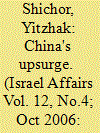

|
|
|
| 4 |
ID:
077622
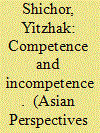

|
|
|
|
|
| Publication |
2006.
|
| Summary/Abstract |
In Mao Zedong's years China's main interest in the Middle East had been to undermine the presence of foreign powers, considered a threat to its security. There had, however, been little that Beijing could have done as it lacked diplomatic relations, political influence, economic wealth and military capabilities. Since Mao's death China has gradually become more active economically with the Middle East, primarily as a labor and arms exporter and as an oil importer. Yet politically, Beijing still plays a marginal role in the Middle East, giving priority to stability, a precondition for economic growth, and implicitly, grudgingly, and perhaps temporarily accepting Washington's predominance in the region. Beijing's increasing economic power has not yet been translated into political effectiveness
|
|
|
|
|
|
|
|
|
|
|
|
|
|
|
|
| 5 |
ID:
079703
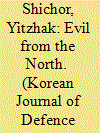

|
|
|
| 6 |
ID:
120693
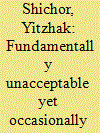

|
|
|
|
|
| Publication |
2013.
|
| Summary/Abstract |
China's 'non-interference' policy is not a new phenomenon. It originates in pre-modern Chinese history when the Empire had been isolated from the rest of the world, as well as in the Mao era when the Chinese-even if they had the will to interfere-did not have the capabilities. Post-Mao and post-Cold War, China has the capabilities but not yet the will to become more involved. Still, economic prosperity and growing political prominence have forced Beijing to compromise. Fundamentally, China's first option remains 'non-interference' and settling of conflicts by the parties concerned. Yet if this fails, then the Chinese prefer an intervention by a regional or professional organisation. If this attempt too, fails, then, reluctantly, Beijing turns to the United Nations Security Council as an option. The worst option is external and independent intervention. All these options are evident in China's Middle East policy.
|
|
|
|
|
|
|
|
|
|
|
|
|
|
|
|
| 7 |
ID:
167489
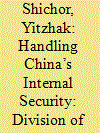

|
|
|
|
|
| Summary/Abstract |
It is widely assumed that the Chinese People’s Liberation Army (PLA) plays a dominant role in handling internal security. Yet a comparative study shows that regular armed forces prefer to avoid becoming involved in domestic conflicts—and China’s PLA is no exception. Concentrating on Uyghur unrest, the article shows that most of the burden of maintaining internal security in China falls on para-military troops, primarily on the People’s Armed Police Force, the Xinjiang Production-Construction Corps and the Militia, and on non-military outfits, such as the Police and internal security units. Maintaining internal security absorbs an increasing share of China’s defense budget, so much so that in recent years Beijing conceals the figures.
|
|
|
|
|
|
|
|
|
|
|
|
|
|
|
|
| 8 |
ID:
065636
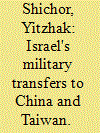

|
|
|
|
|
| Publication |
1999.
|
| Description |
p.68-91
|
|
|
|
|
|
|
|
|
|
|
|
|
|
|
|
| 9 |
ID:
041854
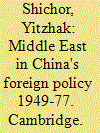

|
|
|
|
|
| Publication |
Cambridge, University Press, 1979.
|
| Description |
xiii, 268p.
|
| Standard Number |
0521222141
|
|
|
|
|
|
|
|
|
|
|
|
Copies: C:1/I:0,R:0,Q:0
Circulation
| Accession# | Call# | Current Location | Status | Policy | Location |
| 018452 | 327.51056/SHI 018452 | Main | On Shelf | General | |
|
|
|
|
| 10 |
ID:
123717
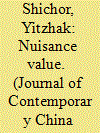

|
|
|
|
|
| Publication |
2013.
|
| Summary/Abstract |
While a small number of Uyghur communities had begun to settle in Germany already in the 1950s and 1960s, since the 1990s they have chosen Munich as their center of national and political activism in Europe and worldwide. By that time the Chinese had begun to apply pressure on the German government to restrict Uyghur activities and to monitor and intimidate them and their German supporters, also by using spies and collaborators. As a democratic country Germany rejected the Chinese demands, although refusing to admit former Uyghur Guantanamo inmates. Despite occasional tension, Sino-German relations have not been affected by the presence of Uyghurs, some of them labeled as 'terrorists' by Beijing. My conclusion is that the Uyghur 'threat' has been deliberately inflated by China as a tool in its relations with other governments and that economic relations and technology import are far too important to spoil by persecuting Uyghurs.
|
|
|
|
|
|
|
|
|
|
|
|
|
|
|
|
| 11 |
ID:
172294
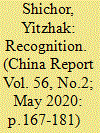

|
|
|
|
|
| Summary/Abstract |
This paper provides a framework for China’s gradual global integration. From historical exclusion, China became initially and partly incorporated to the world in the 1950s and 1960s while ignored by most of the countries. A quantitative breakthrough in the 1970s has led to a universal recognition, still formal and restricted throughout the 1980s and 1990s, making China a great power by the early twenty-first century. China’s rise and gradual integration in the international community is interpreted here based on Marx’s theory of ownership and Professor Charles Taylor’s theory of recognition. Both regard status as a property which is an outcome not just of a unilateral individual claim but of multilateral social relations. Adapted to the international society, these theories underscore China’s global integration. Therefore, China is now entitled to, and capable of, playing a more active and, moreover, leading global role, not just because of its unilateral claims and remarkable achievements, but also, and perhaps much more, because of its multilateral recognition—not in the formal diplomatic sense—of China’s entitlement and capabilities of doing it. Also, in addition to joining, and occasionally heading, international organisations, China introduced its One Belt One Road initiative as a unique contribution of a model for the West, and especially for less-developed countries. While it is post-Mao China’s domestic reform which attract most international attention and are regarded a revolutionary breakthrough with the past, the real and most innovative breakthrough is China’s integration in the world. Domestic reforms were undertaken throughout Chinese history; international integration is new and unprecedented.
|
|
|
|
|
|
|
|
|
|
|
|
|
|
|
|
| 12 |
ID:
096639
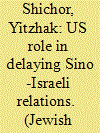

|
|
|
|
|
| Publication |
2010.
|
| Summary/Abstract |
Although by the mid-twentieth century no outstanding problems had existed between Israel and China and although both were interested in formalizing their ties, over four decades passed before diplomatic relations were finally established. The inevitable conclusion is that while bilateral issues had not been an obstacle, the interference of third parties had been responsible for the delay, notably by the United States. This interference, whose origins go back to the emerging Cold War and the so-called "loss of China," acquired momentum following the Korean War and especially after China's armed intervention. Washington applied direct and indirect pressure on Israeli representatives, including the foreign minister, some of whom did not favor relations with China anyway. These constraints caused Israel to procrastinate until Beijing began to realize the potential harbored by Arab and Muslim countries as allies against the West. By 1955, Israel's last-minute attempt to form relations with China was rejected by Beijing.
|
|
|
|
|
|
|
|
|
|
|
|
|
|
|
|
|
|
|
|
|